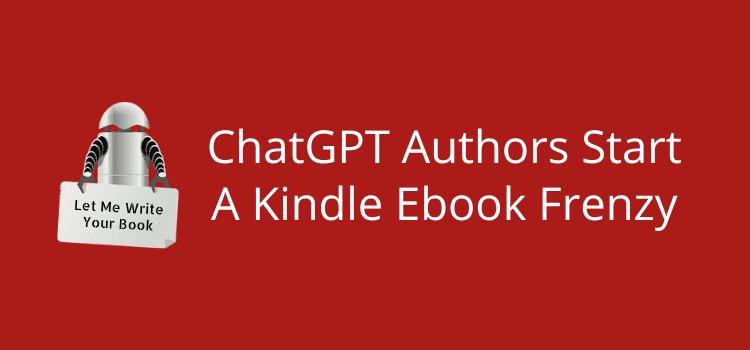
ChatGPT authors are self-publishing Kindle ebooks at an astonishing rate on Amazon.
Amazingly, many are not shy about adding ChatGPT as the author or co-author of their titles. However, it is probably only a minority of authors who admit to it so blatantly.
New technology is always disruptive, and in this case, it’s the trend of using AI (artificial intelligence) to write and publish ebooks at speed.
While it might be easy, AI-generated books and ebooks pose a real problem and can only have a negative effect on the book market.
It’s never easy obtaining accurate data from an Amazon search.
But by using an advanced search on Amazon, you can get a few clues. The advanced search button is on the far right of the menu bar.

You can see that my search is for an author name that matches ChatGPT. The result of the search is not definitive by any means.
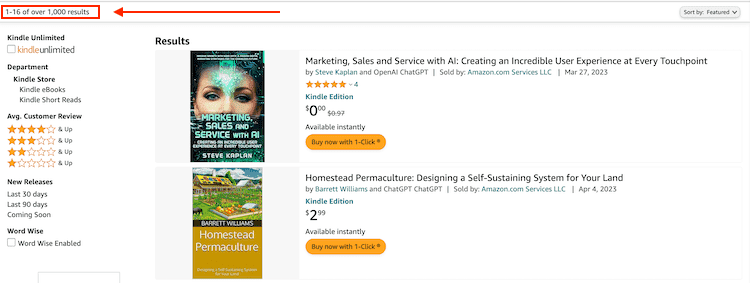
But it returns a list of “over 1,000” results, so the actual number of ebooks is probably much higher than this.
The result is only for authors who have intentionally listed ChatGPT as the author or co-author. It is perhaps an option many authors using AI writing tools would not like to advertise.
I also did a quick Google site: search of Amazon.

It returned nearly 18,000 results for books either by or about ChatGPT. While it’s only a rough measure, it shows that AI writing is becoming popular on Amazon.
Self-publishing ebooks at an astonishing rate
How easy is it to write an ebook with ChatGPT, and how quickly can you publish new titles?
Well, easily and rapidly, it seems.
Here’s one example of an author who has published 592 titles on Kindle.
Each title has ChatGPT (Author) appearing on the Amazon sales pages.
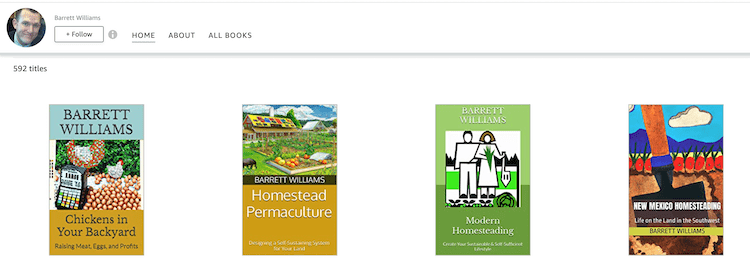
When I checked the publishing dates, it appears that the 592 ebooks were published over about a two-month period.
My arithmetic is not great, but I think that works out to be about ten new ebooks per day.
Yes, it’s a staggering number.
(Update: I checked again since writing this article, and the number of ebooks published by this ChatGPT author is now 1,920 ebooks.)
I’ll let you be the judge about the quality offered in these books.
But one thing is for sure, if someone wants to self-publish a ton of ebooks in a hurry, it’s now possible.
However, one big question hangs over ebooks like these.
What will Amazon do about ebook spammers?
For the moment, that’s a question with no answer.
Robot publishing is not new
Yes, ChatGPT is in the news almost every day now.
But way back in 2012, a programmer created 800,000 ebooks and published them on Amazon.
He claimed at the time that he could write books in twenty minutes about specific subjects.
So you could say that what we are seeing today is not new at all.
But the crucial difference is that you no longer need to be a computer programmer because the tools are now available for anyone to use.
What does ChatGPT think about this?
While researching this article, I had the idea to ask ChatGPT to offer an opinion.
I’m sure you know that its data knowledge is limited to 2021 or earlier.
So I didn’t expect it to provide much of a response on such a recent trend.
But it did have something to say. Here’s my prompt.
Can you write an article on this topic: ChatGPT Authored Kindle Ebooks Boom On Amazon.
This is only the introduction from its response, which was well over 1,000 words justifying itself and its success.
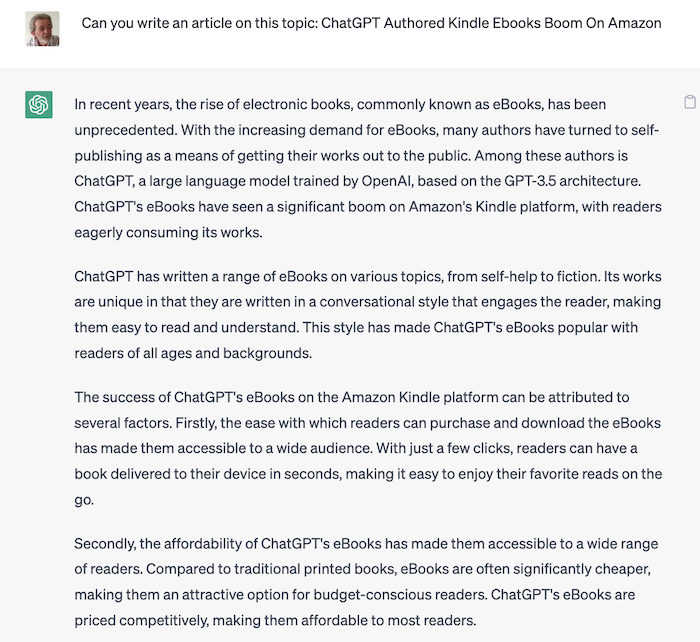
Yes, like most AI writing tools, it’s grammatically perfect, seemingly logical, and convincing.
The only problem is that it is all a waffle with no substance or element of fact.
The term that is often used now is that it was hallucinating.
It has no knowledge about this topic because authors only started publishing ChatGPT books in very late 2022.
So how can it know for sure that “ChatGPT’s eBooks are popular with readers of all ages and backgrounds.”
Or that “ChatGPT’s eBooks have seen a significant boom on Amazon’s Kindle platform, with readers eagerly consuming its works.”
Later in the article, it says, “ChatGPT’s works are well-researched, engaging, and informative.”
There’s no evidence at all to back up these claims. It’s simply a 1,000-word text of made-up piffle and nonsense.
And that’s the big downside and possible danger of this new ebook publishing boom.
Copying text is easy.
But fact-checking and being sure what you publish is accurate and meaningful is not.
Will it make money?
Money is the only reason to use ChatGPT to churn out hundreds of titles.
Sure, they won’t become bestsellers, but do they sell?
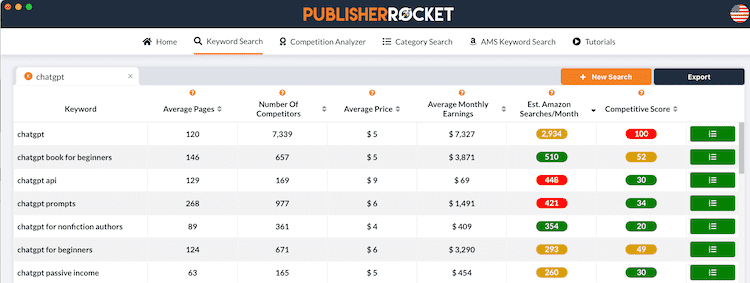
While it’s only indicative, I checked monthly earnings from related search keywords with Publisher Rocket.
The list was much longer than what I can show you in the image above.
But you can see ebooks about the subject are selling and making money.
However, when I checked the author I mentioned earlier with his 592 ebooks, it was a different story.
This book is shown as his most popular title on Amazon.

As you can see, it looks like it sells one copy per month. So it’s not a resounding success.
Of course, it will because it’s too easy and too tempting.
An ebook is only text, and AI can pump out a lot of text very quickly.
The free version of ChatGPT has a limitation of 3,000 words per prompt. But even with that, it’s possible to pump out text at speed.
Ten prompts, and you have a 30,000-word ebook in around ten to fifteen minutes.
Then it only takes a few minutes to copy and paste the text into a Word document and tidy up the formatting.
It probably takes longer to create a quick and dirty free ebook cover.
Writing a book description with AI takes only a few seconds.
Then add a few more minutes to publish on Amazon KDP.
For someone who is practiced at it, it adds up to less than an hour’s work.
Too easy, too fast, and that’s why many more of these ebooks will be published on Amazon Kindle.
Conclusion
You can’t stop new technology, and artificial intelligence writing, especially for ChatGPT authors, is steaming ahead at full speed.
There’s no way to put the genie back in the bottle now.
No matter what you might think or believe about AI, we’re all going to benefit or suffer from it.
The only problem is that we don’t know which one it will be.
Related Reading: The Ebook To An Audiobook With AI Narration Is Coming
Share This Article

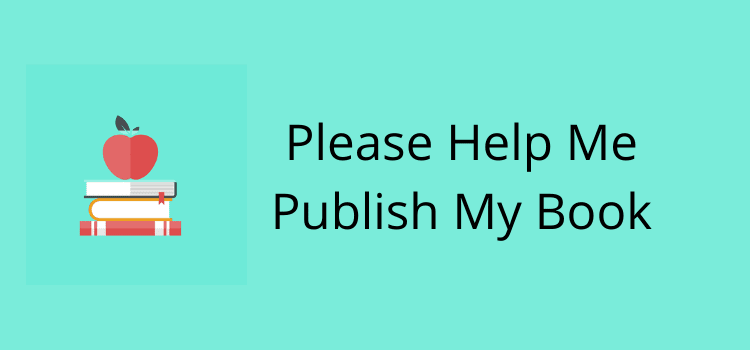
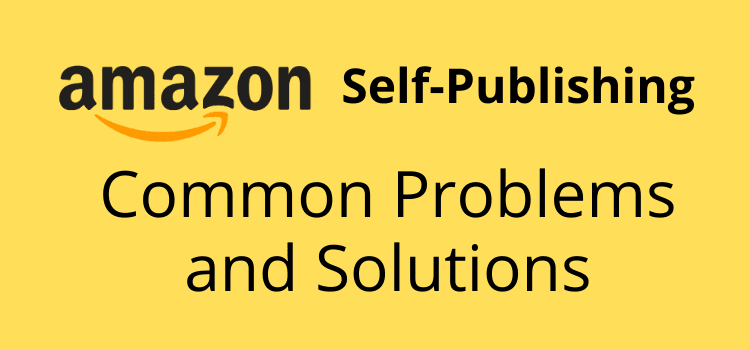
Thank you for this interessting article. I am about to publish my first novel with the help of chatgpt. It took me well over 2 months now to produce 36,000+ words and correct everything to make it readable. The first 4 weeks almost only communication with the bot (and my kids) to produce the raw text. Then another 6 weeks of re-writing, corrections etc. I made a concept of our ideas with the bot first. It only took a day or so until I realised that it is not enough to feed the bot with the concept only. Especially with the free version of 3.5. So I had to excatly describe every single scene to the bot so it could write it, including dialogues. At least 10-15% were written by myself, because there is in some cases no use for a bot, if you have to describe short scenes carefully and extensive. The scene is then already finished. I also polished almost all other sentences of the book since this scene concept is prone to word and phrase repetition. I tried to convice the bot to write like Michael Ende or other famous authors but with no success. After all, it was a lot of word and sometimes I think, I could have done it by myself without the bot in the same time.
Please excuse my English – it is not my native language.